A bottling line is an integrated production system that fills, caps, labels, and packages bottles efficiently. Widely used in the beverage, water and alcoholic drink industries, these automated lines deliver high-speed precision and strict hygiene control. In practice, however, no two bottling operations are identical. Niche producers – from craft breweries to specialty water manufacturers – often have unique products, volumes, and packaging formats. This makes customization essential. Instead of a one-size-fits-all approach, a tailored bottling line is “molded” around the customer’s specific needs. Custom-configured machines not only enhance throughput but also improve quality and flexibility by ensuring each fill and seal meets precise specifications.
 |
| Double-Head Follower-Type Bottle Unscrambler, Filling & Capping Unit with Double-Sided Labeling Machine production line |
Custom bottling equipment can adapt to different products and production scales. As one industry analyst notes, the global bottling market is driven by “diversity in beverage offerings” and a “demand for flexible production lines”. In effect, customizing a line helps companies handle varied bottle sizes, liquid types, and run lengths. Packaging specialists confirm that “most systems can be tailored to your specific requirements,” whether that means unique bottle shapes, specialized filling processes, or enhanced automation. By working with equipment designers, firms can ensure the line’s components – from the filling machines to the cappers and labelers – are matched to the application, maximizing efficiency and minimizing waste.
Key Customization Considerations
When designing a bottling line for a niche market, several factors must be addressed:
● Production Volume and Scalability: Small-batch producers often need flexible capacity. Machines should scale easily from manual or semi-automatic filling to fully automated runs as demand grows. Automated bottling systems can increase output dramatically: studies show automatic machines handle up to 80% more volume than manual processes, processing hundreds of bottles per hour. They reduce dependency on labor and enable consistent running under rising demand (scalability) without massive new investment.
● Product Characteristics: The product’s physical properties dictate equipment choices. For example, high-viscosity liquids (like syrups, lotions or oils) may require piston or pump fillers, whereas carbonated drinks need pressure or vacuum filling. Customization allows selecting the right pump, nozzle and control system for each liquid. As Apollo Technical explains, food, pharmaceutical and other sectors have “different demands… which ordinary equipment cannot fulfill. For example, food processing requires machinery handling varying viscosities, while drug manufacturing needs sterile error-proof systems”. By contrast, a generic filler might over-spray on a thick liquid or underfill a watery mix. A tailored machine eliminates these issues, ensuring each product meets its specs.
● Container Types: Bottle format (size, shape, material) has a major impact. A bottle line machine must be configured for the container. For instance, a beverage bottling line includes conveyors, fillers and cappers that fit one bottle height and diameter. Switching to a different bottle often requires mechanical adjustments or change parts. Custom lines often include quick-change guides, adjustable platforms, or modular sections to ease changeovers. In practice, suppliers will measure the client’s bottle and even print dimensions into the control software. As one packaging blog notes, when choosing equipment like a bottle line machine, “consider production speed and compatibility with different bottle sizes”. Flexibility for multiple bottle formats can be built in by design, reducing downtime during product transitions.
● Quality and Compliance: Niche products often have stringent quality requirements. For example, bottled water lines may integrate filtration and UV sterilization, and pharmaceutical lines demand GMP (good manufacturing practice) construction. Customization can include adding CIP (Clean-in-Place) modules, HEPA filters or special valves. Controls can also be configured for enhanced monitoring. Modern bottling equipment offers digital sensors and SCADA systems that track fill weights, line speed, and alarm conditions in real time. This ties into Industry 4.0 trends: “the beverage bottling industry is embracing digital transformation to optimize operations and cater to individual needs and specifications”. In other words, data integration and smart controls are part of customization. Firms can set target fill volumes, cap torques, and label positions to meet quality standards, with software alerts if anything drifts out of tolerance.
● Automation Level and Ease of Use: Customization also extends to how much automation is needed. Startups or craft producers may prefer semi-automatic or rotary machines that are simpler and cost-effective, while larger niche players might invest in fully automated continuous lines. User interfaces and controls can be customized for operator skill levels: touchscreen PLC interfaces, recipe save-and-recall, and multi-language displays all help staff run the line efficiently. The goal is “user-friendly design,” as one machine builder emphasizes, so staff can train quickly and make changeovers with minimal error. In short, the line should be automated enough to boost productivity, but still manageable by the customer’s team.
Customization Technologies and Components
Filling Systems: The heart of any bottling line is the filler. Customization here includes choosing the fill principle and head design. Options include volumetric (piston or gravity) fillers for still liquids, pressure fillers for carbonated drinks, and peristaltic pumps for extreme precision or hygiene. The number of fill heads can be specified for the required output (e.g. 12 heads for 600 bottles/min). The filling station can be built with adjustable nozzles, fill sensors, and recirculation valves to suit the product. Importantly, custom fillers can handle multiple viscosities: a single machine might have interchangeable filler heads or quick-connect adaptors. This adaptability means businesses can process everything from water and juice to creams and syrups on the same line.
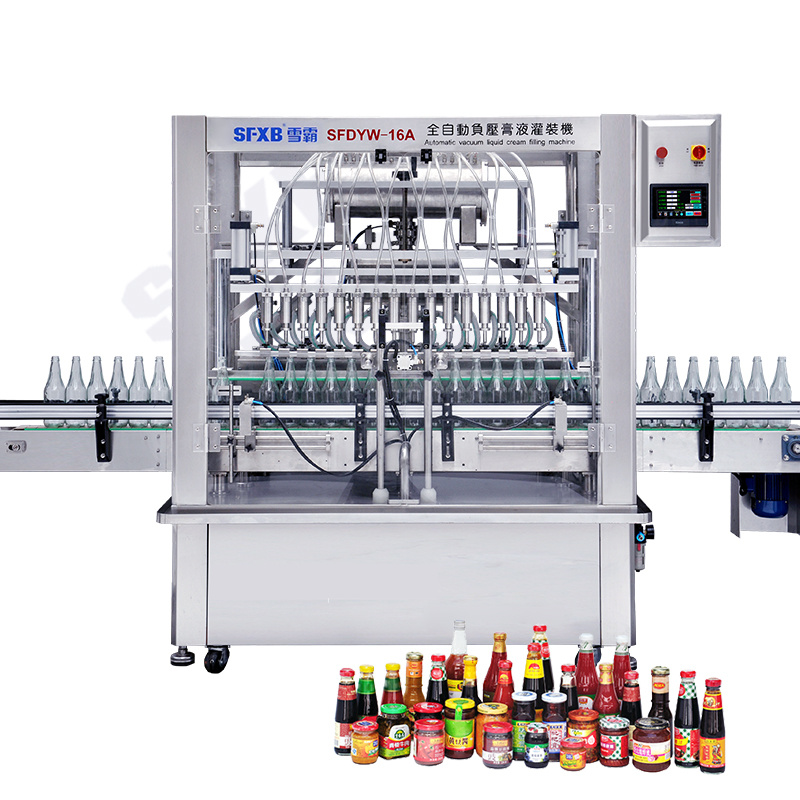 |
| XBDYW-16 Fully automatic 16-head negative pressure ointment filling machine (glass bottle) |
Capping and Sealing: Capping units can also be tailored. Options include snap cappers, screw cappers, corkers, induction sealers, and sterilizing cap feeders. For niche projects, the capping station is chosen to match cap type (plastic, metal, crown) and material (some products need PP caps, others need wax or cork). The system might include torque control for precise seal tightness. For example, one cosmetics producer used a custom capping module to handle delicate glass jars without chipping, ensuring caps were secured to specification. In bottled water plants, cappers may incorporate rinse nozzles to spray bottles just before sealing, preventing contamination.
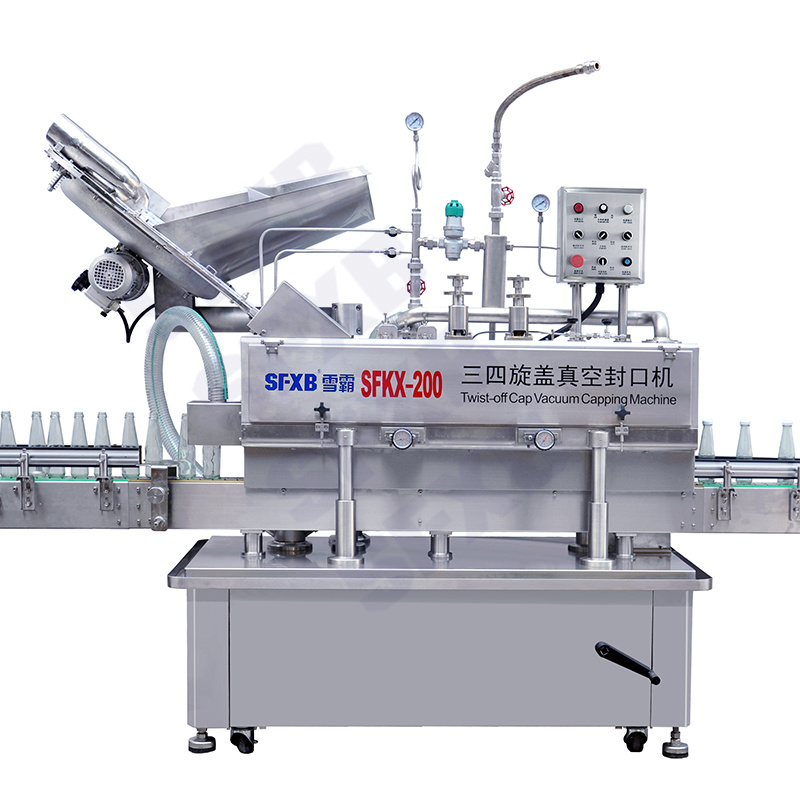 |
| BKX-200 Three-four-rotation vacuum sealing and capping machine |
Labeling and Packaging: Labelers come in many types (pressure-sensitive, shrink-sleeve, clip-on, etc.). A custom bottling line may include multi-format labelers to switch between brands. Designs can integrate vision inspection cameras to verify label placement. For small-batch or seasonal markets, quick-change packaging modules are important. For instance, a niche beverage maker might only produce 3,000 units of a holiday flavor; a custom line can be set up to swap labels with minimal downtime. Similarly, the conveyor speed, accumulation tables, and infeed guides are specified so that bottles don’t jam at any point. All these elements – label applicator, grouping conveyors, inspection – are selected to fit the line’s footprint and product dimensions.
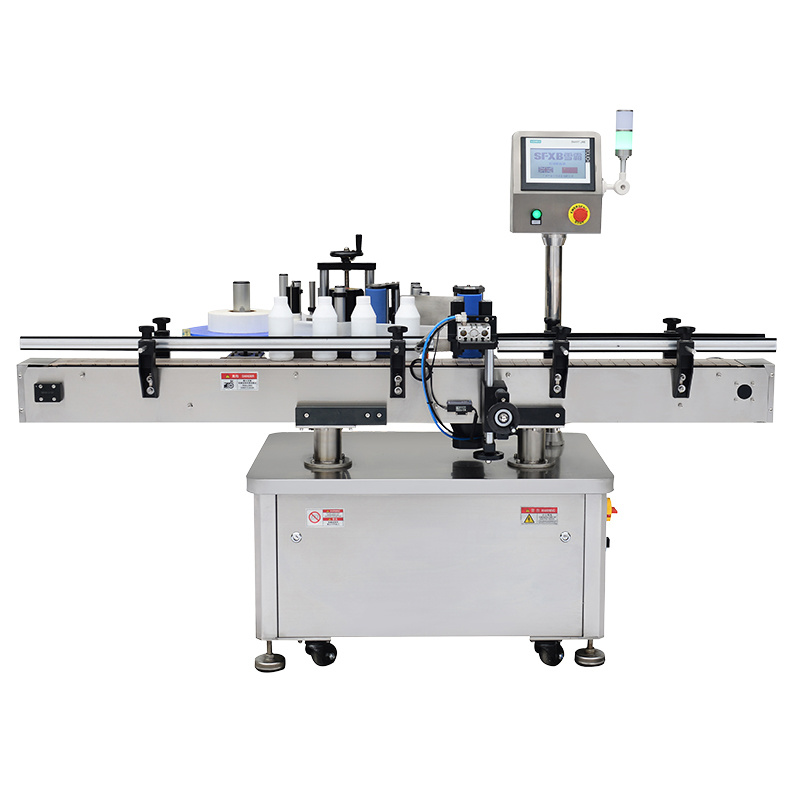 |
| SF-3040 Automatic round bottle positioning and labeling machine |
Automation, Controls, and Industry 4.0: The latest bottling lines leverage smart technology. PLCs and SCADA software are programmed with recipes for each product/packaging. These systems can automatically adjust fill times and speeds when switching bottle size, often by loading saved settings. According to industry analysts, modern bottling plants increasingly use common protocols (like OPC UA) so that every machine – from the filler to the palletizer – can “talk” to a central dashboard. This allows remote monitoring of fill accuracy, performance trends, and even predictive maintenance (alerts when parts need servicing). In other words, customization now includes software design: firms can specify which data to collect, which thresholds trigger an alarm, and how to integrate with ERP systems. Such connectivity is especially valuable for global OEM partners and distributors, who need consistent performance across multiple countries. It also builds trust, as customers see exactly how the line is operating in real time.
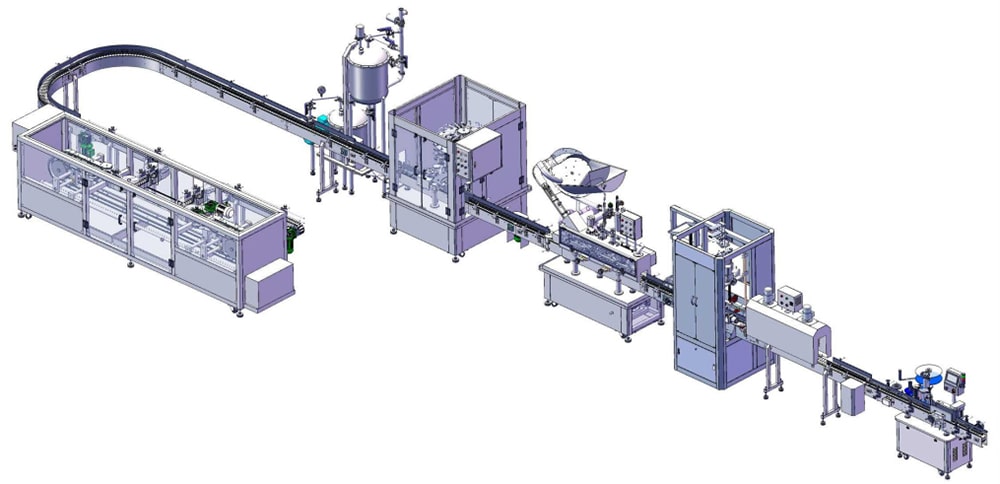 |
| Bottling Line Flowchart: Automatic Bottle Washing → Drying and Disinfection → Vacuum Filling → Vacuum Capping → Heat Sealing → Automatic Labeling |
Benefits of Customized Bottling Lines
Tailored bottling lines deliver clear advantages:
● Flexibility and Scalability: A custom line can handle multiple products without purchasing new machines. For example, modular fillers allow a business to start with one product and later add additional filling heads or conveyors. This avoids costly downtime: changing a standard filler might take hours, but a well-designed custom line has adjustments built in, so changeovers become routine tasks.
● Improved Productivity: By optimizing each component for the intended product, companies gain throughput. Automation boosts output significantly – some machines can fill and cap hundreds of bottles per hour with minimal staff. One industry report notes that automated filling can achieve output rates 5–10 times faster than manual methods. Reducing human intervention also means lower error rates and fewer rejects.
● Precision and Quality Control: Customization ensures consistency. Automated fillers and sensors deliver the exact fill volume and seal torque every time. In fact, industry data show that manual bottling can waste 5–10% of product through overfill and spillage, whereas automated systems reduce this loss to under 1%. The precision also keeps products within regulatory tolerances, which is crucial for food, pharma, and even cosmetics sectors. Companies ultimately maintain better standards and avoid costly recalls or rejections.
● Cost Efficiency and ROI: Tailored lines may have higher upfront costs than off-the-shelf machines, but they often pay for themselves. By running more products on one line and minimizing downtime, businesses see a strong return on investment. Automated lines, with built-in monitoring, typically recoup their cost in 1–2 years through savings on labor, ingredients, and rejected product. Moreover, modular custom lines mean companies only buy what they need now, then expand later – optimizing capital expenditure.
● Competitive Advantage: Finally, a customized bottling line can be a differentiator in niche markets. It lets a brand respond to market trends (flavor or pack changes) more quickly than competitors. It also supports higher product quality, which is a selling point for discerning consumers. For example, many upscale bottled water brands highlight their sterile, purified production process – made possible by their specialized equipment. As one consultant puts it, investing in an advanced bottling line is a “strategic move that enhances production efficiency and ensures superior product quality”.
Applications in Niche Markets
Different industries illustrate the power of customization:
● Craft Breweries and Beverages: Small breweries and artisanal beverage makers often package in a wide variety of bottles (swing-tops, cans, growlers). They benefit from compact rotary fillers or tabletop monoblocks that run 50–200 bottles per minute. Such machines are often built with pneumatic systems for gentle handling and quick size changeover kits. A custom line might include a quiet centrifugal stirrer (for settling yeast) and a dedicated carbonator module. As a case in point, one microbrewery retooled its line to bottle a seasonal ale in slim 330ml bottles; the filler’s star wheel and sensor were adjusted to the new shape, improving yield.
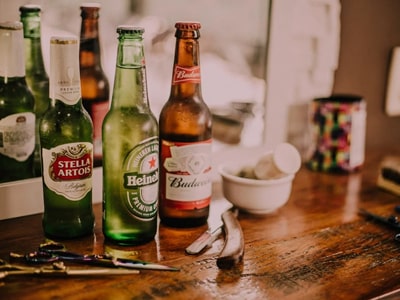
● Bottled Water and Functional Water: Pure bottled water producers often install a bottle water filling machine that controls sterile water fill volumes precisely. They may even call this integrated setup a “bottle water making machine” if it includes purification and labeling in one plant section. Custom features here include multi-tier filters, ozone sterilization for bottles, and pressure-fitting cappers to prevent leaks. One bottled-water customer replaced its generic filler with a custom volumetric system, allowing faster cleaning and an inside-out sterilization cycle between batches – a necessity for maintaining water purity.

● Cosmetics and Pharmaceuticals: These sectors require strict cleanliness. Customized lines often use stainless steel sanitary designs with skid-mounted CIP loops. For example, a cosmetics manufacturer commissioned a special filler for thick lotions; the piston fill pump had custom soft seals to handle aloe vera gel without clogs. Similarly, a pharmaceutical startup designing liquid vitamins had a bottling line with laminar airflow hoods and reject sensors for droplet formation, ensuring each vial was filled exactly. In each case, off-the-shelf food/beverage machines could not meet the sanitary or accuracy demands, but a tailored machine could.

● Specialty Foods and Liquids: Think hot sauce, wine, kombucha or olive oil. Each product’s acidity, color or foaming behavior may require different machine materials (e.g. Teflon-coated parts for acid resistance) or fill speeds. A wine bottling line, for instance, may be made from electropolished stainless steel and run much slower (to avoid oxygening the wine) than a beer line. FAQ resources note that “scalable wine bottling line solutions” exist for boutique wineries that treat bottles gently and work at varying speeds.

● OEM and Distributor Collaboration: Niche-market producers often work directly with OEMs (original equipment manufacturers) or local integrators to develop these lines. Experienced suppliers will ask about current and future products, regulatory needs, and plant layout. They can advise whether to prioritize compact semi-automatic units (for a startup) or fully automated rotary machines (for a growing brand). Importantly, the best manufacturers also provide training and global support. As one FAQ explains, many equipment makers allow “direct manufacturer purchases” for the latest models, and emphasize the customization work they do to fit their clients’ niche requirements.
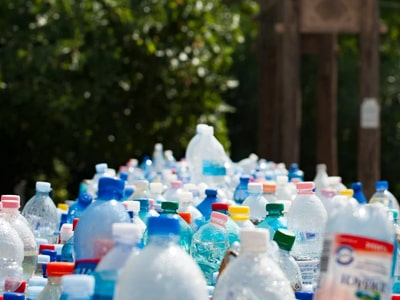
Conclusion
In summary, bottling line customization is crucial for niche markets. By tailoring each segment of the line – from the filler to the capper to the labeler – companies can handle specialized products and packaging with high efficiency. Custom lines combine flexibility, precision and automation to meet unique production goals. With the rise of digital controls (Industry 4.0) and modular machinery, even small or specialized producers can now enjoy the benefits of big-factory automation. As a result, customized bottling lines help small players stay competitive, increase quality, and enter new markets with confidence. Investing in a tailor-made bottling system is not just an expense; it’s a strategic enabler for innovation and growth in any niche beverage, water or liquid product industry.
| References: | |
| 1. | Bottling Line Machinery Market to Set Phenomenal Growth From (OpenPR, 2025) –Retrieved from:openPR |
| 2. | Automation and Real‑Time Control of a Wine Bottling Production Line, IFAC‑PapersOnLine (2017)–Retrieved from: ScienceDirect |
| 3. | Implementation of Automated Bottle Filling System Using PLC, Springer Professional (2021) –Retrieved from:Springer Professional |
| 4. | Filling Process Optimization through Modifications in Machine Settings, Processes (MDPI, 2022) –Retrieved from:MDPI |


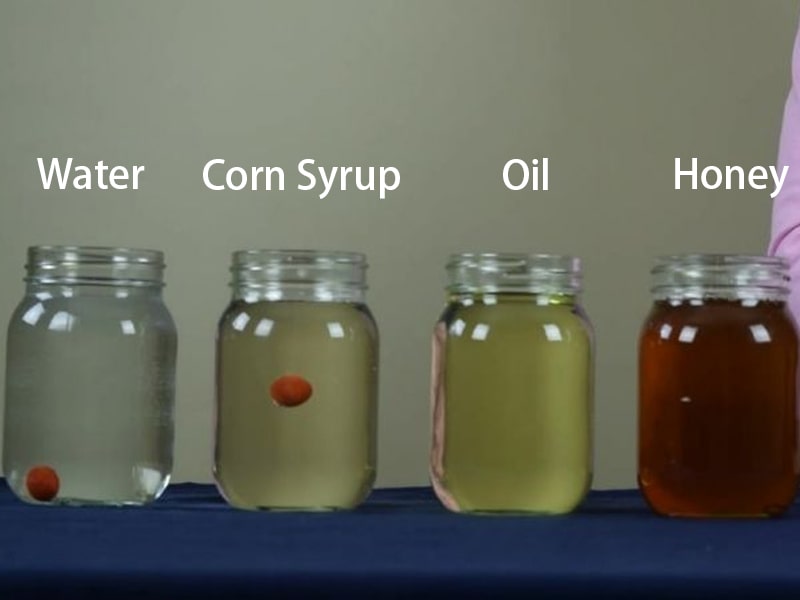
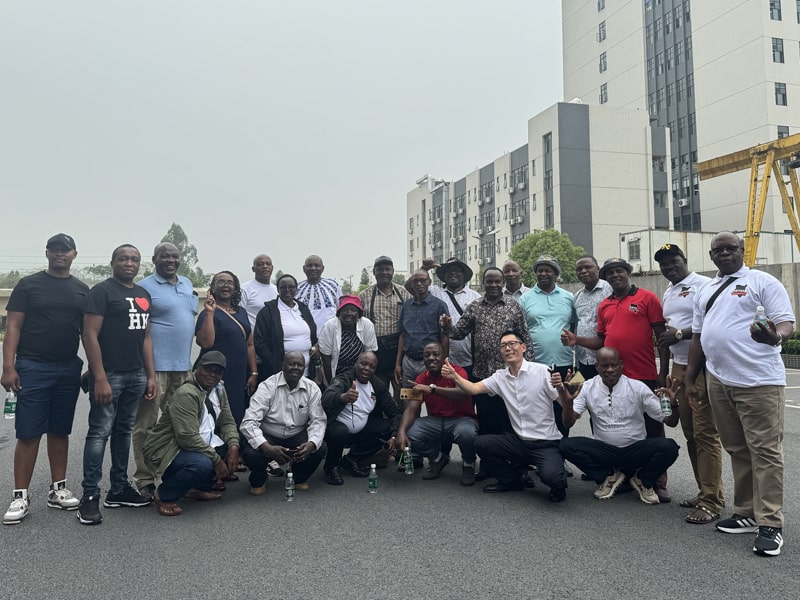
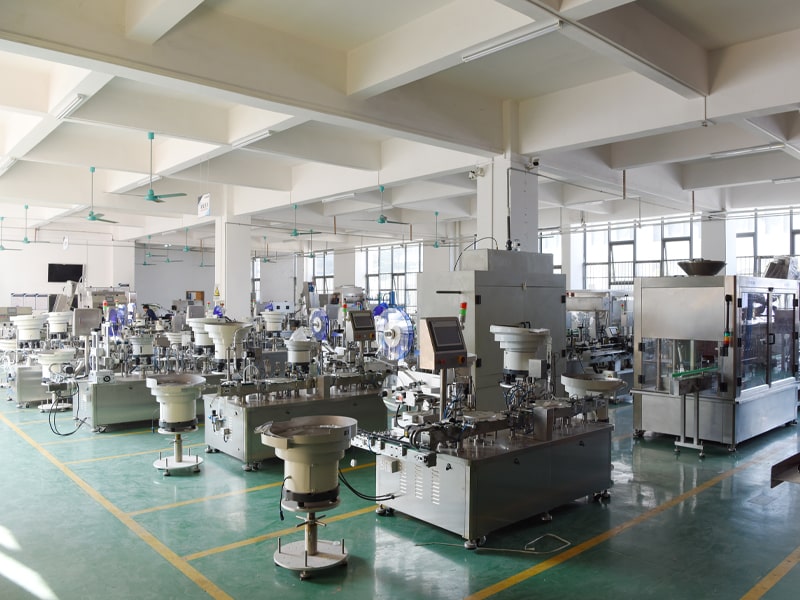

Comments